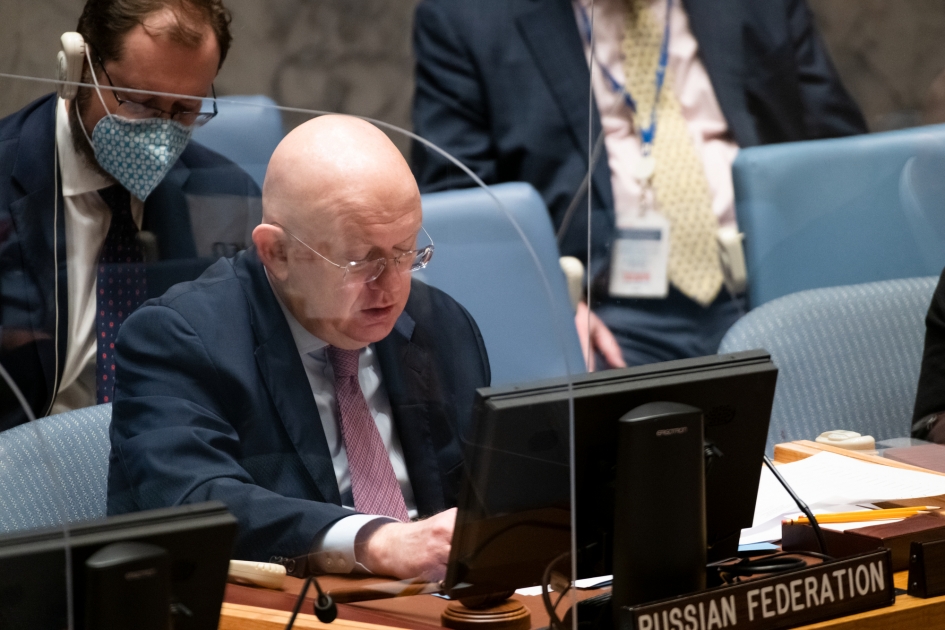Statement by Permanent Representative Vassily Nebenzia at UNSC briefing on the political and humanitarian situation in Syria
We thank G.Pedersen for the briefing, and welcome new Deputy of UN OCHA, Ms. Joyce Msuya, to this meeting. We thank her for sharing her assessments.
Colleagues,
We proceed from the need to establish constructive inter-Syrian dialogue, first of all in the framework of the Constitutional Committee. We are convinced that there is no alternative to promoting Syrian-owned and Syrian-led dialogue under UN mediation, without any external interference and artificially imposed deadlines.
In this regard, we welcome plans of SESG Pedersen to convene 7th round of Committee’s Editorial Board in Switzerland next month. We hope that this work will concentrate on dialogue between Syrian delegations and encourage them to agree on the constitutional reform without getting distracted by minor issues.
Therefore, we will continue interacting with Syrians, the Special Envoy, and other stakeholders. For this purpose, Foreign Minister Lavrov met this week in Moscow with his Syrian counterpart, Minister Faisal Mekdad, and SESG Pedersen. At the meetings, focus was made on the tasks of comprehensive Syrian settlement on the basis of UNSC resolution 2254.
Mr.Pedersen, we hope that you will also focus on the forthcoming work at the Constitutional Committee and not get carried away by initiatives that do not enjoy support of both the Syrian government and opposition and should not substitute for inter-Syrian consultations which Special Envoy is directly mandated to promote.
The Committee should work smoothly, without artificial interruptions. Sessions must convene regularly, same as the meetings of the Editorial Board. Frequent postponements of meetings, explained by eagerness to perfect the rules of procedure, apparently do not help the process.
Political efforts are especially demanded now that the situation in some of Syria’s regions that are out of control of Damascus remains tense. Large-scale terrorist attack on al-Sinaa prison in Hasakeh gave a clear confirmation of this dangerous escalation. The attack that was followed by an operation to neutralize terrorists and clear the area with the help of aviation and armored vehicles killed and injured dozens peaceful Syrians. More that 45,000 people had to leave their homes. All this proves the need for an uncompromising fight against terrorism in Syria, and not for indulging ISIL.
We note that by this moment, almost all IDPs returned to their hearths and homes. However the situation with more than 700 children who remain confined in the prison is very alarming.
Colleagues,
Let me make also make a point about the efforts of Russia’s Presidential Commissioner for Children's Rights. On 24 February, 14 children aged 3-15 years were returned to Russia. Five of them had stayed at orphanages of Damascus, and the other 9 had been evacuated from refugee camps in cross-Euphrates area. We will continue searching for Russian children in Syrian refugee camps and working to take them back home. Such efforts started in 2017, upon instruction of President of Russia. Starting from December 2018, 364 Russian children have been repatriated from conflict zones in the Middle East. At this moment, sets of documents have been prepared for evacuation of further 128 children.
The humanitarian situation in Syria remains complex. 14 million Syrians live in need of assistance. Socio-economic challenges, exacerbated by suffocating unilateral sanctions, multiply and strike root. Progress of resolution 2585 that was called to boost comprehensive humanitarian assistance to Syria remains limited.
Over the six months, only 2 internal convoys were dispatched to Idlib, there is still no access to areas of Turkish operations, Western donors keep politicizing the financing of early recovery projects.
The resolution rolled over for another half year after the Secretary-General issued his special report. We expect that the United Nations and other members of the global community will galvanize efforts in order to ensure full and scrupulous implementation of the document in the forthcoming period. Our discussions and the decision that we will make in July this year will largely depend on whether this approach is duly upheld and brings tangible results.
Attempts to cherry-pick most attractive elements of the document, thus prioritizing cross-border humanitarian assistance and ignoring early recovery projects and the tasks of extending humanitarian access over the contact lines are unacceptable. They do not help solve Syria’s humanitarian and socio-economic problems.
